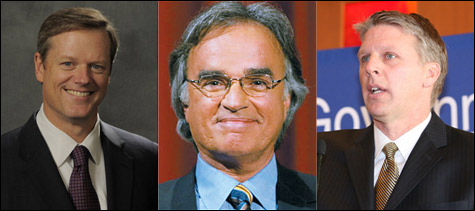
RIGHT TIME Three candidates have lined up to unseat Deval Patrick in the upcoming election: (from left) Charlie Baker (top), a long-time Republican; Christy Mihos, a 2006 independent gubernatorial candidate; and State Treasurer Timothy Cahill, a former Democrat turned independent. |
Last summer, the upcoming race that got most Bay State politicos salivating was the run for governor. The staggering economy and a series of missteps — ranging from expensive drapes to patronage appointments — had Governor Deval Patrick looking vulnerable. That prompted serious challengers to jump into the race early, seeming to ensure an autumn full of skirmishes as they jockeyed for pole position.
But that highly anticipated race for governor has been in a holding pattern ever since Ted Kennedy's death this past August. The state's political attention (such as it is) has since focused on his memorial, the selection of a temporary replacement, the Democratic primary in December, and now the final showdown between Martha Coakley and Scott Brown for the seat.
That is expected to change soon after the January 19 special Senate election, when the patient Republican gubernatorial challenger Charlie Baker seems well-poised to finally make a move.
While most folks were looking elsewhere, Baker raised more than $700,000 in December, bringing his total contributions to an impressive $2.3 million since he declared his candidacy in July. His lieutenant-governor selection, State Senator Richard Tisei, pulled in another $300,000.
Baker campaign advisors tell the Phoenix they expect to be able to run a $15 million campaign, counting funds from Baker and Tisei's committees, as well as from the state Republican Party and national sources, such as the Republican Governors Association.
That won't equal the 2006 spending of Republican Kerry Healey — whose total was boosted by nearly $10 million out of her own pocket — but even state Democratic operatives concede that it should be plenty to run an aggressive statewide campaign.
As much as the bottom-line numbers, Baker's finance reports have also set tongues wagging for some of the contributors who previously tended to support Democrats.
The most visible of these is Paul Levy, president and CEO of Beth Israel Deaconess Medical Center. After his name appeared as a Baker contributor, Levy posted on progressive blog site Blue Mass Group about his disappointment with Patrick.
Other traditionally Democratic donors who have contributed to Baker include Joel Alvord of Shawmut Capital Partners, Edward Murphy of Mentor Network, and Norman Stein of Boston Medical Center.
These defections shouldn't be a huge surprise, says one Democratic consultant, because Baker is not only considered an ideological moderate, but he has also built up a large network of personal ties, through his work at Harvard Pilgrim, with the Bill Weld administration, and with a variety of boards and commissions.
Even so, the loss of key supporters could signal trouble ahead if Baker's candidacy gains traction, demonstrating that he has a real chance to beat incumbent Patrick.
So far, though, Baker has done little to boost his popularity — or even his meager name recognition.
That's apparent in a new Boston Globe/University of New Hampshire poll, released earlier this week, which showed Baker just as unknown as he was in its last poll, taken six months ago. In the new survey, Baker was rated favorably by 19 percent, and unfavorably by 13 percent — barely changed from the 16 and 14 numbers from before he started campaigning. Two-thirds of the electorate still don't know enough to even have an opinion of him.